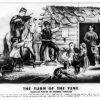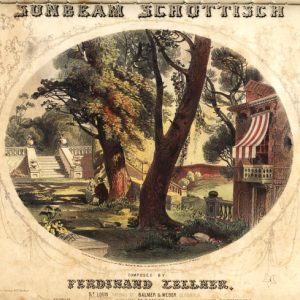calsfoundation@cals.org
Ferdinand Zellner (1831–1919)
Ferdinand Frederick Zellner lived in Fayetteville (Washington County) from 1852 until 1863 and wrote a piece of music called “Fayetteville Polka,” which is believed to be the first Arkansas composition to be published as sheet music.
Ferdinand Zellner was born in Berlin, Prussia (now a part of Germany), in August 1831 and reportedly came to the United States in 1850 as part of the orchestra that toured with Jenny Lind, the “Swedish nightingale.” After the tour ended and Lind returned to Europe, Zellner and his brother, Willhelm Emil Zellner, stayed in America and settled in Fayetteville.
Ferdinand Zellner filed paperwork with Washington County in 1852 to become an American citizen and was hired by Sophia Sawyer as a music teacher for the Fayetteville Female Seminary. Sawyer died in 1854, but the school continued under the ownership of two of the teachers, and Zellner continued as a music teacher.
The Balmer & Weber publishing house of St. Louis, Missouri, published Zellner’s composition of “Fayetteville Polka” in 1856, as well as a second song titled “Sunbeam Schottisch.” Both the polka and the schottische styles of music originated in Bohemia and became popular in Germany during the early nineteenth century. By mid-century, they had become popular in America, too, and Zellner’s two compositions were reprinted across the country.
Although Zellner was thirty years old at the outbreak of the Civil War, he does not appear to have served in either the Confederate army or the Union army. He purchased the property of the Fayetteville Female Seminary in 1862 and appeared intent on keeping the school in operation despite the destruction of much of Fayetteville during the early part of the war.
In 1863, the major buildings of the school were destroyed by fire, and Zellner left Fayetteville for St. Louis, along with many other families who were sympathetic to the Union. “My desire is, like theirs, to find a place which we can call our home once more, a place of which we have been so ruthlessly deprived at the very outset of this unholy rebellion,” Zellner wrote in 1864. He initially stayed with Matilda and Jonas Tebbetts, who had earlier left Fayetteville and purchased a farm, which they dubbed “Exilia.” Zellner stayed for several months but moved into a boarding house in St. Louis in 1864 so that he could more easily offer music lessons and earn money. At the same time, the Tebbettses began planning a move to California with former Fayetteville residents Robert and Mariah Graham. Robert Graham had been offered presidency of a college at Woodland, California, and Zellner was invited to join the group.
On June 1, 1864, however, federal officials arrested Zellner and several other residents at his boarding house. They were taken to the Gratiot Street Military Prison and charged with being members of a secret society plotting the secession of Missouri.
Tebbetts, a lawyer and former Arkansas prosecutor and judge, and Charles Balmer, one of the principals of Balmer & Weber, came to Zellner’s defense immediately. They were joined quickly by Judge Barton Bates of the Missouri Supreme Court, all arguing that Zellner could not have been involved. Zellner was released on $1,000 bond initially and then released from the bond in time for him to join the Tebbettses and Grahams on their trip to California.
Although his friends did not stay long in California, Zellner did, finding employment as a professor of music at Pacific Methodist College in Santa Rosa. He also married Penelope “Neppie” Cocke in 1866; she died two years later. In 1874, Zellner married Olive Jeanette “Jennie” Beam, and they had six children, five of whom lived to adulthood. In 1876, he left Pacific Methodist for a similar position at Mills College near Oakland, California, where he was one of many music professors in a college that made music as central to its curriculum as mathematics and literature.
Zellner worked there for ten years before moving the family back to Santa Rosa, where he once again taught at the reorganized Pacific Methodist College. He and his wife became estranged in about 1900, and she moved back to the Oakland area. He survived the 1906 California earthquake, which devastated San Francisco and most of Santa Rosa.
Zellner died of liver failure on July 2, 1919, at Santa Rosa. He is buried in Santa Rosa’s Rural Cemetery. Zellner’s brother, Emil Zellner, stayed in Washington County after the Civil War, and his descendants still live in northwestern Arkansas.
For additional information:
Allison, Charlie. “Ferdinand Zellner: Fayetteville’s First Composer.” Flashback 62 (Spring 2012): 3–26.
Banes, Marian Tebbetts. The Journal of Marian Tebbetts Banes. Fayetteville: Washington County Historical Society, 1977.
Zodrow, David. “Long Forgotten Song Surfaces.” Northwest Arkansas Times, December 22, 1974, pp. 1D–2D.
Charlie Y. Alison
University of Arkansas, Fayetteville
 Arts, Culture, and Entertainment
Arts, Culture, and Entertainment Classical Music and Opera
Classical Music and Opera Ferdinand Zellner Sheet Music
Ferdinand Zellner Sheet Music 




I’m wondering if Ferdinand Zellner was related to the Zellner (some have it Zellnor) who owned a plantation in my home community of Rohwer in Desha County. I never met any Zellners, but some of my classmates’ families worked as sharecroppers there.